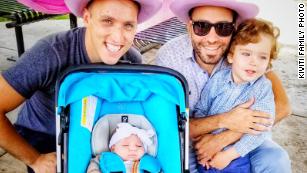The
ruling issued Wednesday found that the department's refusal to grant Roee and Adiel Kiviti's daughter, Kessem, a passport "contravenes the United States Constitution, the Immigration and Nationality Act ... and the Administrative Procedure Act."
"We are tremendously relieved that the court recognized what we always knew: that our daughter was a U.S. citizen by birth," Roee and Adiel Kiviti said in a statement. "We are proud we taught our little girl to stand up for what's right even before she could crawl. No child should be denied her rights because her parents are LGBT, and no family should have to endure the indignity we did."
A State Department official told CNN Friday the department "is aware of the Court's ruling and is reviewing the decision with the Department of Justice. We have no further comment at this time." ate Department in September 2019.

Same-sex couple sues State Department over denial of daughter's citizenship
Although Roee and Adiel Kiviti are both US citizens, as is their son Lev, their now 16-month-old daughter was not granted birthright citizenship due to a State Department policy that considers her "born out of wedlock." Because of that, she was required to have a biological link to a US citizen who had resided in the US for at least five years. Adiel, with whom she had that link, was a few months short of that residency requirement at the time.
The lawsuit was filed in the US District Court of Maryland by Immigration Equality, Lambda Legal, and pro bono counsel Morgan Lewis.
"We're confident that the law is on our side," Roee Kiviti told CNN at the time. "Our daughter is a natural-born American. She deserves all of the privileges and responsibilities that come of that."
Both of the Kiviti children were born in Canada using an egg donor and a gestational surrogate. When the Kivitis applied for Kessem's citizenship, her application was processed not under the policy for children born abroad of two US parents, but rather flagged for surrogacy. Under the State Department policy on "assisted reproductive technology," "a child born abroad to a surrogate, whose genetic parents are a U.S. citizen father and anonymous egg donor, is considered for citizenship purposes to be a person born out of wedlock." Because Kessem was only biologically linked to Adiel and he was just months short of the residency requirement, her application was denied.
The Kivitis are not the only LGBTQ family to have sought legal recourse to the policy. According to a release from Immigration Equality, theirs was the fourth suit filed against the State Department by the LGBTQ immigrant rights organization. A federal judge ruled in favor of another same-sex couple who faced a similar hurdle under the State Department's surrogacy policy last February. The State Department appealed that ruling.


Comments